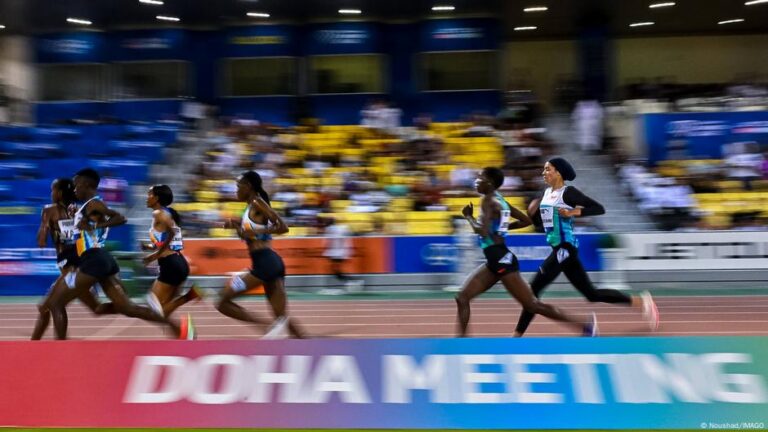Given the football World Cup was in the country just three years ago, the eight major global championships the country has hosted this year alone, and the Asian Games scheduled to take place in there in 2030, Qatar bidding for the 2036 Olympics feels like the next logical step for the Gulf country.
The difference this time around is all about scale. There will be 36 sports on show in Los Angeles in 2028, with a variety of disciplines inside each sport. Then there is the political aspect of an Olympic Games, which is different to that of a football World Cup.
Still, Jean-Loup Chappelet, professor of public management at the University of Lausanne and Olympic scholar, believes Qatar’s history of hosting means they are very capable of hosting a Summer Olympics.
“Having the facilities is not the most important for the Olympics nowadays,” Chappelet told DW.
Instead, he said, there are two key criteria that the International Olympic Committee (IOC) has been looking for in a host country in recent years.
“One is political support and the other is popular support. It’s more important than the venues. In fact, the venues can be changed, like we have seen a lot in LA (Los Angeles) recently and also in Brisbane. So nobody doubts that the venues are available. What is important is political support from the public authorities.”
Weather and image problematic
Given the average high temperature in Qatar in July is 44 degrees Celciuis (111 Fahrenheit), hosting an Olympic Games at that time of the year is out of the question.
“It would have to be in November, like the World Cup 2022,” said the Frenchman, who worked on the bid for the 1992 Winter Olympics in Albertville.
“Can we do (that)? It could probably happen, but it’s a big problem because the whole sports calendar is organized around the Olympics.”
Assuming that were possible, then there’s also the question of the two aforementioned criteria. Given that national political support isn’t likely to be a problem, attention will turn to popular support.
An easy way to gauge this is through a referendum, as was held in Germany regarding the mere idea of bidding for the 2036 Games.However, Chappelet isn’t so sure he can see Qatar conducting something similar.
“In general, the IOC is satisfied with polls,” he explained.
“The polls are conducted by an independent company. So they see what is the (level of) popular support. The problem in Qatar is that the local population is rather small and there’s a large migrant population. So the validity of this popular support is to be discussed, for sure.”
If that support is also secured, there’s also the issue of dealing with neighboring Saudi Arabia. If Qatar won the bid, this would likely prevent Saudi Arabia from hosting the Olympics for many years. But with the 2034 World Cup already confirmed to be in Saudi Arabia, it would seem likely that the kingdom would want to host an Olympics soon after that.
Assuming none of that is a problem though, the final hurdle is the broader impact of the IOC choosing Qatar.
“Human rights are quite important” Chappelet said. “Especially for the construction of the facilities, the state and the workers. And so there were big problems there. Qatar made some efforts but the the image-perception of Qatar is not as good as it can be for other countries.”
Despite the years of criticism though, the World Cup did take place in Qatar.
“It’s not insurmountable,” Chappelet said. “It can be done. Of course they [IOC] will have a lot of criticism, but the question is whether the IOC wants to bear all this criticism or whether they will take another less risky path?”
Do India, Korea and Indonesia have a chance?
Chappelet believes the confirmation of Qatar’s bid will force the others into action.
“It means they have to rehab a little bit,” Chappelet said. Given the heat, the current doping issues and the poor results on the field of competition, Chappelet believes that India is already out of the running. South Korea is also in the mix but the strength of its bid depends on the outcome of next year’s mayoral election in Seoul, while Chile is likely one for the more distant future given it will be Asia’s turn. The Games are supposed to rotate every season, and with the 2028 edition to be in North America and 2032 in Oceania, the 2036 Olympic Games should be in Asia or Africa, who have never hosted before.
That puts Qatar and Indonesia in a good position, although Chappelet believes Istanbul has a strong chance.
“It [Turkey] is a major country, and it has bid several times. It has a booming economy. Of course they have problems also like many other countries, maybe with human rights, but it’s also a Muslim country, which I think is an argument,” Chappelet said. “The Muslim world should get the Games one day.”
The final decision is expected to be delayed until 2027 after newly elected IOC President Kirsty Coventry recently said IOC members wanted to be more involved in the selection process and to allow for a thorough review of how previous hosts were selected.
“There was overwhelming support from the IOC members for a pause to be done, and a review of the future host election process,” Coventry said.
“Members want to be engaged more in the process and secondly there was a very big discussion in and around when should the next host be awarded.”
Edited by: Chuck Penfold


